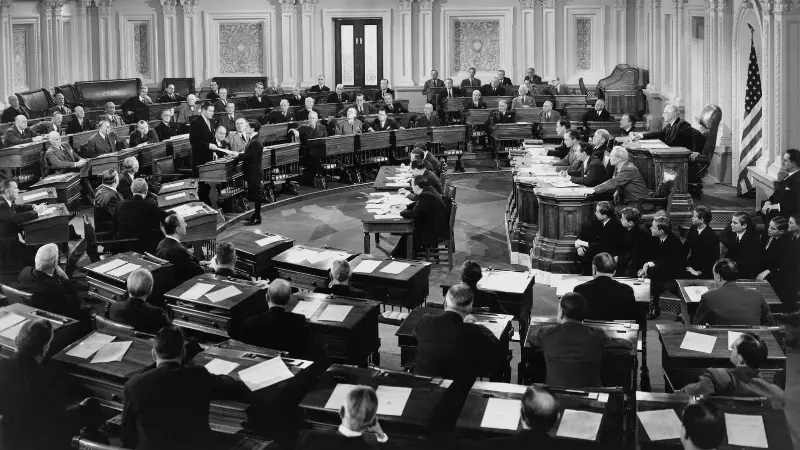Can a felon run for office? Has such a thought ever hit you? The possibility of running for any political office despite prior charges or incarceration. Then you are like me because it has.
Follow me and I will lead you through this very interesting thought process that I’m sure would have you going “Huh, I didn’t know that.”
Can A Felon Run For Office?

Being incarcerated can be a life-altering event. This hits people differently and even when released, hangs on them in almost every endeavor they decide to partake in after. This could be housing, employment, and certain recreational activities like hunting. But the issue being discussed here is that of politics.
Politics has been a conscious idea since man formed communities, coming together to protect and defend themselves from nature and other people, probably from a different community. This is because humans, like animals, observe hierarchy and structure. Politics has to do with the governance of a country or area. This has been the best way to organize and maximize human efficiency for society. For this to happen, the best and most competent depending on the metric of measurement is commonly selected to head the group.
So to address the question we will refer to the laws that speak to the matter of governance, which majorly has to do with the Constitution alongside other legal documents and history. Do not fret, I will do my best to make it as engaging and captivating as I possibly can.
Know if a felon can become a correctional Officer?
Constitutional Rights
The original Constitution of the United States, established in 1789, defines the structure, functions, powers, and limits of the national government. It also states individual freedoms, rights, and obligations.
The U.S. has a Federal Constitution, and then each state also has its constitution.
The Constitutional rights of citizens are established in this document.
What is a Constitutional right? You may ask. Well, it is a duty, power, or restriction of power. All Constitutional rights are written in the national Constitution which is the supreme law of the United States. Together they are called the Bill of Rights.
No legislative body has any right or power to pass any law that may contradict the Constitution, it would be considered unconstitutional and immediately invalid. Constitutional rights can only be altered once the Constitution is amended.
The U.S. Constitutional rights are superior to any state Constitution. State Constitutions can add rights for citizens in that specific area or state, but they can not take away any U.S. Constitutional rights.
Constitutional rights limit the power of individuals in government. It also does not apply to a person’s rights relative to another individual.
That being said, the federal government must always stay within the limits of any Constitutional rights when adopting laws to change those rights. That means the federal government cannot pass a law limiting the Constitutional right of free speech. They would first have to amend the constitution before they will successfully do that.
State Requirements To Hold Public Office
The question of whether felons can hold public office depends on the state. In some states, when a felon has a conviction older than ten (10) years, they are then allowed to hold public office.
Other states refuse to allow anyone convicted of a crime involving moral misconduct from working in an elected office. These crimes include lying, deception, fraud, receiving public funds, or breaking financial responsibilities.
For example, in states like Georgia, you may not hold public office unless your rights have been restored and at least 10 years have passed since the completion of your sentence. You must also not be convicted of an additional crime of moral turpitude since the original offense was committed.
Election laws are different from one state to another.
The normal qualifications needed to run for office may include:
Residency
You must be a resident in the district you plan to represent full-time or have your primary residence there.
Time In The District
You also may be required to have first lived in the district for a certain amount of time, from a few months to a year or longer.
Age
Some offices have a minimum age requirement before you are allowed to contest.
Other Qualifications
Certain positions require certain related professions to partake. For example, you do need law enforcement experience to run for sheriff. However, you must be an attorney in your state before you can run for a legal office like District Attorney, prosecutor, or judge.
Federal Requirements To Hold Public Office

Federal elected positions are different from state offices. Why? Well, because the U.S. Constitution takes an approach to government that leaves decisions up to individual states.
Federal rights to hold office are different from those at the state level. There is a set standard that must be met for all federal offices. These rights do depend on the office in question.
To run for Congress, you must:
- be at least 25 years old and a citizen of the United States for seven years to run for the House.
- You must be at least 30 years old and a citizen for at least nine years to run for the Senate.
- You must be a resident of the state where you live for any congressional position.
To run for president, you must first be at least 35 years old, a natural-born citizen, and a resident of the U.S. for at least 14 years.
Can A Felon Run For Mayor?
It is possible to run for the office of mayor. This, like any other worthwhile endeavor, is not an easy one, it is made even more difficult by your record. Nonetheless, you do still have a chance. Before I go in-depth, the question is.
What Is A Mayor?
This is the highest-ranking officer in a city or town. (S)he is the chief executive officer responsible for overseeing the financial decisions and local planning.
As expected of such an important role, a mayor has many duties overseeing the main departments of a city. They include:
- Education
- Police
- Fire
- Housing
- Transportation
The mayor’s duration in office after being elected could be anywhere from two to four years. But first, that individual must meet certain requirements for (s)he to become mayor. One of the most important is that they must be a registered resident of the city or town. An application and petition with signatures must be filed, including a filing fee.
The type of government structure is what stipulates the duties of the mayor in that location. That being said, the degree of authority that a mayor has will vary.
Let us examine the different types of city government, and how they, in turn, affect the authority that a mayor will have.
Some of the options a city has for its local government structure include:
A Council-Weak Mayor
In this structure form, the city maintains the law. The mayor serves more as a ceremonial position. The mayor has the final authority regarding their financial matters and will preside over all council meetings.
A Council–Strong Mayor
In this structure, the mayor has more authority. Council members are in charge of legislative processes while the mayor takes responsibility for administrative duties. (S)he hires and fires staff possesses veto power and implements legislation that the council passes.
The Council-Manager
This is another type of mayor. Here, (S)he is just a symbolic head of the city. In summary, The mayor is equal to other city council members.
The Commission System
This structure form is similar to a council-manager system.
One commissioner may be designated to function as mayor, but this is largely an honorific or ceremonial designation. The mayor principally serves as chairperson or president of the commission and typically does not have additional powers over and above the other commissioners. Chairing meetings is the principal role.
Among specific expectations for being able to have civil rights restored are such things as
- Completing all parts of your sentence, including probation
- Not having any pending legal charges
- Having no outstanding restitution
Felons who meet these criteria may seek clemency to allow them to regain their civil rights. Though their record will remain.
This restores your civil rights and allows felons to run for public office. Federal positions differ from state offices, as the U.S. Constitution leaves many decisions up to individual states to establish.
Challenges To Running For Office As A Felon
While felons may be allowed to run for public office such as mayor or to serve on the city council, it is generally not easy.
Among other challenges are the negative effects of a felony conviction as regards public trust. Along with the general apprehension or mistrust that people perceive felons with. They also see felons as not being trustworthy and consider them to be dishonest.
It becomes an uphill battle crafting a plan to convince people otherwise when the knowledge of your felony conviction comes to light after having civil rights restored. It is even advised that you should be honest with it, as hiding it would bring more problems. Knowing full well that the records can not be hidden.
It is advisable that you bring it up and embrace it, that you did make mistakes.
You must be honest and open about a conviction but not be defensive and dwell on the mistakes. After it becomes public, leave it alone and not draw any more attention to it.
If you are lucky to have your civil rights restored through clemency and your record expunged, it can make an enormous difference to your success in becoming a mayor.
Can A Felon Run For President?

According to the Constitution, there are no laws stating otherwise, so in summary. Yes, felons can run for president. The Constitution describes the requirements needed to hold the Office of the President:
- The president must be a person born in the United States and is at least 35 years old.
- The person must also be a resident.
- The president can hold the office for two terms of four years each.
If the candidate has been in office during another president’s time–as in the situation with Richard Nixon and Gerald Ford, the term limit rules state that the replacement can only run for office once.
At the cost of being tagged a cynic, it needs to be said that just because a felon can run for office does not mean they will win.
Why? This is because voters usually want a person with moral character, and a crime-free history gives them the impression that they can trust you. Though in a world of possibilities, there can always be an unprecedented act or candidate. Never has such a topic been so current as the Donald Trump situation, with his intentions for running for office and his current legal troubles.
What Disqualifies You From Running For President?
The Constitution, as with all other rights of a nation sets the standards for people who want to run for president.
- People under the age of 35 cannot run for president.
- Anyone not born in the United States and is not a US citizen cannot run for office.
Can A Convicted Felon Be Elected President?
As long as the presidential candidate meets all the requirements stated in the Constitution, even a convicted felon could run for president.
Running for the office of president is one part. Winning the election is a whole different thing.
The odds are already stacked against you as the voters have the option of choosing someone who does not have a felony conviction.
Though there has not been any record of an American president who had been convicted of a felony. Many people connected to the executive branch, in recent history, have been convicted of various felonies. Amongst these include tax evasion, perjury, and obstruction of justice. An example is Richard Nixon’s vice president, Spiro Agnew.
How Can A Felon Succeed While Running For Office?
Going for the highest most respectable office of the land, it is expected that candidates for president look to expose their opponent’s weaknesses and prove they are the better pick. A felony record would be like a gold mine to exploit, so it is expected that felons would struggle a bit while running for office. There is no greater stain than that of integrity, which a felony conviction is a testament to.
Felons will majorly be on the defensive in this type of environment explaining what they did and what they learned from their experience in the criminal justice system. The task will also be convincing the people that they are now changed.
They will need to explain their rehabilitation process and somehow assure the public that they will not commit any crimes in the future.
The greatest error would be claiming you have done nothing wrong. This immediately turns into an unwinnable battle, because the people have placed their faith and belief in the legal system. You will learn that trying to make the court system look inept is close to impossible. People do not like having their beliefs challenged. It quickly becomes you versus every other person that believes in the system, and they have the majority.
The United States government’s three distinct branches work hand in hand, and it is expected that anyone running for president should have respect for the way the three branches work together.
Claiming you have been wrongly accused becomes an attack on the judicial branch of government, which could cause you to lose votes.
It is advised that you work with a campaign manager who can craft a strong story and image that wins over the majority of the public.
Conclusion

United States voters love a from-nothing to a success story. This connects them as something they can get behind because of their aspirations and dreams.
Can felons visit these countries?
You would also need a sponsor, as this endeavor is quite expensive. Having a team, and doing media and press releases, amongst other things like organizing events, all cost money. But do not forget, the media has a reputation for sensationalism from time to time. Partly because this sells papers more. So, do not be surprised that you will spend most of your time having to answer and correct the impression of being a felon.
There is also the issue of the demographic more willing to connect to you being felons. This is an issue because, in most states, felons have their voting rights revoked, so this already costs you the people that may relate to you.
So, I guess it is safe to say that while no laws in existence prevent felons from running for president, the process might be difficult for anyone with a felony conviction. This goes as well for other public offices, and though there are a few success stories for some of the lesser offices, the fact remains. People will find it difficult to vote for or trust people with a felony record to serve in public office.

Human right activist, writer, married and passionate about felons. Pearl loves to travel, cook and hates injustice of any kind. She gives and writes helpful info people can read for enlightenment.
